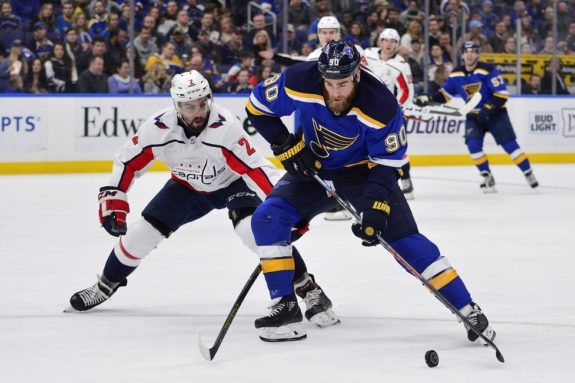I considered writing this piece a while ago but I figured it’d probably become obsolete in a big hurry. After all, the “race” for the final playoff spots in the NHL’s Western Conference couldn’t possibly stay as bad as it was. But alas, it did. So I decided to put fingers to keyboard after the contenders played on Tuesday night.
Here’s what said contenders did: the Edmonton Oilers lost. The Colorado Avalanche lost. The Arizona Coyotes lost. The Vancouver Canucks lost. The Anaheim Ducks lost. The Minnesota Wild lost, but in overtime. Which means the big winner, the lone winner, were the St. Louis Blues, the only team competing for one of the lower playoff spots in the West to actually post a win.

In the “race” for a playoff spot, the word deserves to be in quotation marks.
The NHL’s Western Conference
A quick look at the Western Conference paints a clear picture. Barring disaster, four teams have effectively punched their playoff ticket: the Winnipeg Jets, Nashville Predators, Calgary Flames and San Jose Sharks. Two more teams are in good shape: the Dallas Stars and Vegas Golden Knights.
Of the other nine teams in the West, eight have records which put them in playoff contention and even the West’s last-place team could get into the mix. The teams which held the bottom-two spots in the West going into Tuesday should be effectively eliminated by now. But hey, they both won on Tuesday, meaning the Chicago Blackhawks and Los Angeles Kings have a chance – and are gaining ground.
The West’s Wildcard “Race”
The seventh spot in the West belongs to the Wild, four games above even, or plus-four (I find this metric less confusing than sorting through the combination of points and games in hand). The eighth spot, the last wildcard playoff spot, is held by the Blues, at plus-two (they project to 85 points over the full season).
The Canucks and Avalanche are even and tied for ninth. In 11th, at minus-two, are the Coyotes and Oilers. Tied for 13th are the Ducks and Blackhawks at minus-three. The Kings, who probably have too many teams to jump over, are in last place at minus-five.
From the eighth spot to 14th spot, the gap is just five (plus-two to minus-three). From seventh to 15th (last place), the gap is just nine.
In comparison, plus-two, the eighth spot in the West, is good for 11th place in the Eastern Conference, with a gap of seven to a playoff spot. Yikes!
Treading Water
What feels likes a “race” to the bottom has plenty of consequences. Since every Western Conference team is within striking distance of a playoff spot, it makes it trickier for teams to decide to rebuild and trade away talent. The last-place Kings did start this process, they remain the only team to move a major piece in exchange for future opportunities.
It is hard to tell a team which has kept itself in a playoff “race” that it is time to quit, especially with this much season remaining. Even if they’ve kept themselves in the “race” because of the mediocrity around them.
The Blackhawks represent one of the more interesting cases. At the season’s midpoint, they projected to 72 points. Last season, the final wildcard spot went to a team with 95 points. If things resembled last season, the Blackhawks would need to play Presidents’ Trophy level hockey over the second half of the season to get into the playoffs.
In their 13 games since the midpoint, they’ve posted a 6-4-3 record, or 1.15 points-per-game, which is about the league average. How can they move up by being average? Well, only two of the teams situated between seventh and 14th place have averaged more than 1.00 points-per-game (which is itself well below league average) in their last 10 games: Chicago and Dallas.

A few teams are skidding particularly hard. The Avalanche are 2-8-0 in their last 10 games. The Oilers are 3-5-2 and the Ducks are 2-7-1. What does this mean? The teams which manage to merely tread water, like Chicago, are actually advancing.
The Injury Excuse
Some teams can legitimately blame injuries for their struggles. Anaheim and Arizona have been hit particularly hard, while the Wild are missing a pair of major pieces.
In back-to-back games, the Ducks have been blown out by scores of 9-3 and 4-1, and it might be tempting to throw in the towel. Yet, they have just gotten back two potentially important pieces in Corey Perry and Patrick Eaves. Whether these goal scorers can find their games enough to help the NHL’s lowest scoring team is an open question. But if they can, the Ducks are certainly capable of moving up.

The Coyotes probably deserve a better fate and the team might just find a way to the playoffs despite a flood of injuries impacting every part of the team. Injuries have hit the starting goaltender, some of their better defensemen and several starting forward. But there are no difference-makers coming back this season, which means Arizona’s challenge is larger than most.
The Coyotes are much improved and their culture change is working for them, but injuries are working hard against them. Still, this is a team which will get an enormous longer-term benefit from overcoming adversity and gaining a playoff spot.
The Wild have missed high scoring defenseman Matt Dumba since mid-December, and will now be missing team captain Mikko Koivu, too. Both are likely out for the rest of the regular season. These are the sorts of injuries which can change a team’s trajectory.
Side Effects Across the NHL
There are a host of side effects of this “race.”
For starters, with every Western Conference team in the hunt, there won’t be many sellers at the trade deadline. That means the sellers reside primarily in the Eastern Conference and the list of sellers is down to about a half-dozen teams. With a lot of buyers and not a lot of sellers, expect supply and demand to take over.
The teams well-positioned to acquire players (promising prospects, an abundance of higher draft picks and in some cases, cap space) will find themselves in bidding battles, those limited may find themselves having to work around the edges. That is how Nashville gets a role player in Brian Boyle but Toronto lands a difference-maker in Jake Muzzin.

The top Western teams, meanwhile, are left to jockey for position in the standings, which history shows isn’t particularly meaningful. These teams can focus their energies differently than if they needed to fight for a playoff spot. The Sharks, for example, would not normally be locked into a playoff spot with their record and this much season remaining.
But in this unusual season, they are. This means players dealing with injuries can take longer to recover, the team can take a longer look at its young players and the starting goalie doesn’t have to carry a high workload (high workloads correlate strongly against Stanley Cup success). The teams which take advantage of the unusual circumstances can position themselves for playoff success.
The Western Team Which Emerges
The Stanley Cup playoffs are a wide-open affair with upsets galore. The team which captures the final playoff spot could well be a team that gelled late in the season; Or benefited from a trade where the player integrated particularly well; Or got a lot healthier; Or simply has a goaltender who found his game at the right time. Predictions are all over the map.
This “race” reminds me of a friend, who while driving, had the steering wheel come off the column. As he recounted the moment, his first reaction was surprising light. He thought of handing the wheel to his passenger and say “here, you drive.” In a way, this is life from the middle to the bottom of the Western Conference. No team seems to want to steer its own direction; their fate is left to others.
Will a team or two come charging forward in the next month? Probably. Maybe. Heck, I thought it’d have happened by now. But if not in the next month, then the month after. For sure. Maybe. Or not.